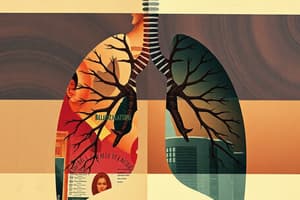Podcast
Questions and Answers
What is the main function of the diaphragm during inhalation?
What is the main function of the diaphragm during inhalation?
- To interfere with lung expansion
- To create negative pressure in the thoracic cavity (correct)
- To relax and facilitate airflow out of the lungs
- To decrease the thoracic cavity volume
Which structure is responsible for the majority of gas exchange in the lungs?
Which structure is responsible for the majority of gas exchange in the lungs?
- Bronchi
- Alveoli (correct)
- Nasal cavity
- Bronchioles
What primarily regulates the breathing rate?
What primarily regulates the breathing rate?
- Concentration of oxygen in the lungs
- Temperature of the inhaled air
- Physical activity level of the individual
- Brain centers monitoring CO2 and O2 levels (correct)
What occurs during expiration in the breathing process?
What occurs during expiration in the breathing process?
Which component of the respiratory system helps filter and warm inhaled air?
Which component of the respiratory system helps filter and warm inhaled air?
How does carbon dioxide primarily stimulate the respiratory centers?
How does carbon dioxide primarily stimulate the respiratory centers?
What is the primary mechanism driving gas exchange at the alveoli?
What is the primary mechanism driving gas exchange at the alveoli?
What role do accessory muscles play in breathing?
What role do accessory muscles play in breathing?
Flashcards
What is respiration?
What is respiration?
The process of exchanging gases between the organism and the environment.
What is internal respiration?
What is internal respiration?
The exchange of gases between the blood and the tissues of the body.
What is breathing?
What is breathing?
The process of moving air into and out of the lungs.
What is the diaphragm?
What is the diaphragm?
Signup and view all the flashcards
What are alveoli?
What are alveoli?
Signup and view all the flashcards
What is the respiratory membrane?
What is the respiratory membrane?
Signup and view all the flashcards
What is the respiratory center?
What is the respiratory center?
Signup and view all the flashcards
How does gas exchange through diffusion occur?
How does gas exchange through diffusion occur?
Signup and view all the flashcards
Study Notes
Introduction to Breathing and Gas Exchange
- Respiration is a crucial life process involving the exchange of gases.
- It's broadly categorized into external respiration (involving the exchange of gases between the environment and body) and internal respiration (exchange of gases between the blood and body cells).
- This study focuses on the process of external respiration.
Breathing Mechanism
- Breathing is the mechanical process of moving air into and out of the lungs.
- It's driven by the diaphragm and intercostal muscles.
- Inspiration (inhaling) involves the contraction of the diaphragm and external intercostal muscles, expanding the thoracic cavity and reducing pressure, thus drawing air into the lungs.
- Expiration (exhaling) involves relaxation of the diaphragm and external intercostal muscles, decreasing the thoracic cavity volume and increasing pressure, forcing air out of the lungs. Accessory muscles aid in forceful breathing.
The Respiratory System
- The respiratory system in humans comprises the nasal cavity, pharynx, larynx, trachea, bronchi, bronchioles, and alveoli. All are adapted for efficient gas exchange.
- The nasal cavity warms, moistens, and filters inhaled air.
- The bronchi branch into smaller bronchioles ultimately leading to alveoli, air sacs specialized for gas exchange.
- Alveoli have a large surface area and thin walls, facilitating efficient diffusion of oxygen and carbon dioxide. Alveolar walls are lined with a layer of thin squamous epithelial cells and a network of capillaries.
Gas Exchange at the Alveoli
- Gas exchange primarily occurs across the respiratory membrane, separating air in the alveoli from blood in the capillaries.
- Oxygen from inhaled air diffuses down its concentration gradient from the alveoli into the capillaries.
- Carbon dioxide from the blood diffuses down its concentration gradient from the capillaries into the alveoli.
- This diffusion is a passive process driven by partial pressure differences.
Regulation of Breathing
- Breathing is regulated by the respiratory centers in the medulla oblongata and pons of the brain stem.
- These centers monitor the levels of carbon dioxide and oxygen in the blood and adjust breathing rate accordingly.
- Carbon dioxide levels are the primary stimulus for breathing. Increased CO2 levels stimulate the respiratory center to increase the breathing rate. Changes in pH due to CO2 levels also affect breathing.
- Receptors in the carotid and aortic bodies also monitor blood oxygen levels and can influence breathing rate under extreme conditions.
Respiratory Volumes and Capacities
- The volume of air inhaled and exhaled during breathing varies.
- Inspiratory reserve volume, expiratory reserve volume, tidal volume, vital capacity, residual volume, and total lung capacity are different terms used to describe respiratory volumes and capacities.
Disorders of the Respiratory System
- Various disorders can affect the respiratory system, including asthma, bronchitis, emphysema, and lung cancer.
- These disorders can hinder the efficient exchange of gases, leading to breathing difficulties and reduced oxygen supply to the body.
Studying That Suits You
Use AI to generate personalized quizzes and flashcards to suit your learning preferences.
Description
This quiz explores the essential processes of respiration, including external and internal gas exchanges. You'll learn about the mechanics of breathing and the role of the diaphragm and intercostal muscles in this life-sustaining process. Prepare to test your knowledge on how the respiratory system functions.





